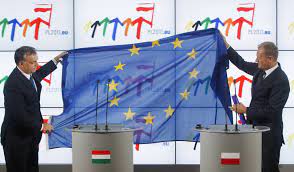The true strength of the European Union lies in its diversity of opinions

Brussels:!We cannot allow select countries to impose their will on others on critical issues of war and peace, such as the imposition of sanctions or the financing of weapons, Balázs Orbán writes.
In an open letter published in Politico on 12 June, seven EU foreign ministers proposed a shift towards the greater use of qualified majority voting, QMV, in the block’s Common Foreign and Security Policy.
Accepting such a proposal would not only endanger national sovereignty but also undermine the strength of the EU.
Primarily, a country’s foreign policy is crucial in shaping its direction, and the pursuit of a sovereign foreign policy is necessary to protect its independence.
The European Union was established after World War II and gained new dynamism after the collapse of the Soviet Union, both times with the aim of overcoming imperialistic ambitions and fostering cooperation among equal, independent, and sovereign member states.
We must acknowledge that geopolitics matters, which highlights notable distinctions between smaller and larger nations, as well as between the North and South and the East and West.
We cannot allow select countries to impose their will on others on critical issues of war and peace, such as the imposition of sanctions or the financing of weapons.
Secondly, as evidenced by surveys such as the ECFR’s recent opinion polls, the European public holds a range of diverse opinions when it comes to foreign policy.
Opting for unanimous decision-making fosters constructive discussions and ensures that diverse opinions, even those diverging from the mainstream, are duly considered as they reflect the will of the people.
In light of the EU’s motto, “united in diversity,” rather than marginalising these differences, the bloc should leverage the diverse perspectives of its member states.
Opting for unanimous decision-making fosters constructive discussions and ensures that diverse opinions, even those diverging from the mainstream, are duly considered as they reflect the will of the people.
As Konrad Adenauer stated, “we all live under the same sky, but we don’t all have the same horizon”. The true strength of our community lies in its diversity of opinions.
Enlargement is a geopolitical necessity
Thirdly, the current challenges we confront clearly show that enlargement is not just an option but a geopolitical necessity.
There is a growing consensus that enlargement can provide the much-needed dynamism to the EU, leading to the possibility of having 35 member states in the near future.
While the specific framework is yet to be finalised, the idea that enlargement requires deeper integration and sacrificing sovereignty for member states is misleading.
A successful and competitive EU necessitates embracing a more flexible integration model that highlights the importance of open discussions, constructive debates, and compromises among its member states.
Given their historical backgrounds, prospective member states have a strong desire to preserve their independence and sovereign foreign policy.
We must therefore foster an environment where candidate countries aspire to join the EU.
Proposing a shift to QMV in foreign policy decision-making may risk alienating these candidate countries and hindering the enlargement process.
A successful and competitive EU necessitates embracing a more flexible integration model that highlights the importance of open discussions, constructive debates, and compromises among its member states.
Lastly, the legal backbone of the seven ministers’ proposal is the utilisation of Article 31 of the Treaty on the European Union which would introduce “constructive abstention”, permit QMV for common positions as well as for certain operative actions, and establish a passerelle clause to make QMV the standard procedure in specific foreign policy areas.
Out of these three proposals, constructive abstention is the least controversial, something even Hungary used last October.
In this era of rapid geopolitical transformations, it becomes even more important for the EU to show a unified front, demonstrating our solidarity and coherence in decision-making.
However, the other two options are not viable solutions as they would require surrendering state sovereignty without obtaining the necessary democratic mandate from the people.
“Seeking consensus is and will always be at the core of our European identity.” This statement, emphasised by the seven ministers in their letter, captures the essence of our European identity indeed: valuing as well as showing mutual respect, engaging in constructive discussions, and striving for compromise.
In this era of rapid geopolitical transformations, it becomes even more important for the EU to show a unified front, demonstrating our solidarity and coherence in decision-making.
We must collaborate and make collective foreign policy decisions, recognising that true unity can only be achieved through consensus.





